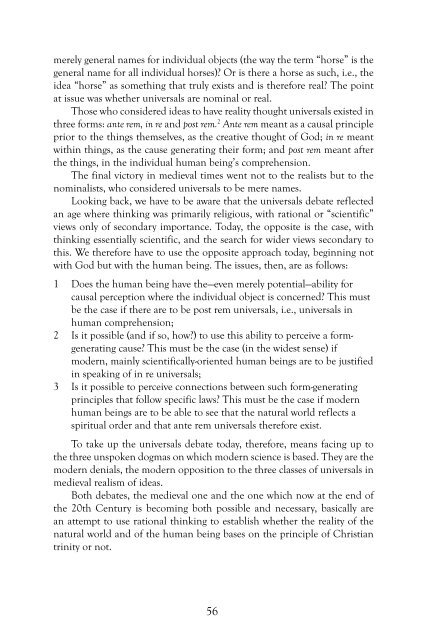When Healing Becomes Educating, Vol. 1 - Waldorf Research Institute
When Healing Becomes Educating, Vol. 1 - Waldorf Research Institute
When Healing Becomes Educating, Vol. 1 - Waldorf Research Institute
You also want an ePaper? Increase the reach of your titles
YUMPU automatically turns print PDFs into web optimized ePapers that Google loves.
merely general names for individual objects (the way the term “horse” is the<br />
general name for all individual horses)? Or is there a horse as such, i.e., the<br />
idea “horse” as something that truly exists and is therefore real? The point<br />
at issue was whether universals are nominal or real.<br />
Those who considered ideas to have reality thought universals existed in<br />
three forms: ante rem, in re and post rem. 2 Ante rem meant as a causal principle<br />
prior to the things themselves, as the creative thought of God; in re meant<br />
within things, as the cause generating their form; and post rem meant after<br />
the things, in the individual human being’s comprehension.<br />
The final victory in medieval times went not to the realists but to the<br />
nominalists, who considered universals to be mere names.<br />
Looking back, we have to be aware that the universals debate reflected<br />
an age where thinking was primarily religious, with rational or “scientific”<br />
views only of secondary importance. Today, the opposite is the case, with<br />
thinking essentially scientific, and the search for wider views secondary to<br />
this. We therefore have to use the opposite approach today, beginning not<br />
with God but with the human being. The issues, then, are as follows:<br />
1 Does the human being have the—even merely potential—ability for<br />
causal perception where the individual object is concerned? This must<br />
be the case if there are to be post rem universals, i.e., universals in<br />
human compre hension;<br />
2 Is it possible (and if so, how?) to use this ability to perceive a formgenerating<br />
cause? This must be the case (in the widest sense) if<br />
modern, mainly scientifically-oriented human beings are to be justified<br />
in speaking of in re universals;<br />
3 Is it possible to perceive connections between such form-generating<br />
principles that follow specific laws? This must be the case if modern<br />
human beings are to be able to see that the natural world reflects a<br />
spiritual order and that ante rem universals therefore exist.<br />
To take up the universals debate today, therefore, means facing up to<br />
the three unspoken dogmas on which modern science is based. They are the<br />
modern denials, the modern opposition to the three classes of universals in<br />
medieval realism of ideas.<br />
Both debates, the medieval one and the one which now at the end of<br />
the 20th Century is becoming both possible and necessary, basically are<br />
an attempt to use rational thinking to establish whether the reality of the<br />
natural world and of the human being bases on the principle of Christian<br />
trinity or not.<br />
56

















